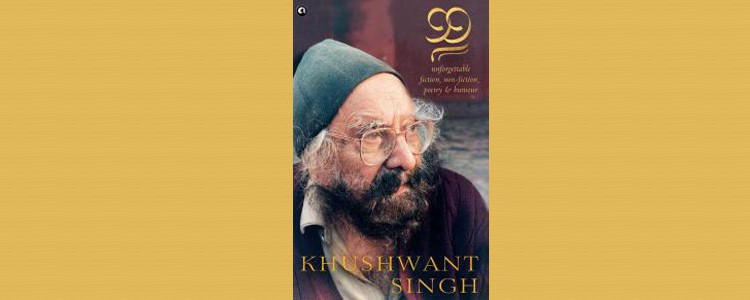99 Khushwant Singh
 The first time I met Khushwant Singh was when I drove my grandfather, Mr N. K. Mukarji, across to Sujan Singh Park to meet him. It was a meeting between old college friends. Khushwant Singh and my grandfather’s eldest brother became friends in St. Stephen’s College and remained very close. Unfortunately my granduncle Atul was diagnosed with galloping cancer at a very young age. The first person Uncle Atul informed of the doctor’s diagnosis was Khushwant Singh. They were posted in London– Uncle Atul was a Customs officer and Khushwant Singh was with the Indian High Commission. Within a few months my granduncle had passed away. Recounting the conversation decades later, the events of the late 1950s were crystal clear to Khushwant Singh. By the time the two men finished reminiscing they were both crying. I was stunned to see these two legendary men weeping. But what stayed with me from that morning meeting were not the tears as much as the lucidity with which the two men recalled events as if it had happened only yesterday. In a way it also made history come alive for me.
The first time I met Khushwant Singh was when I drove my grandfather, Mr N. K. Mukarji, across to Sujan Singh Park to meet him. It was a meeting between old college friends. Khushwant Singh and my grandfather’s eldest brother became friends in St. Stephen’s College and remained very close. Unfortunately my granduncle Atul was diagnosed with galloping cancer at a very young age. The first person Uncle Atul informed of the doctor’s diagnosis was Khushwant Singh. They were posted in London– Uncle Atul was a Customs officer and Khushwant Singh was with the Indian High Commission. Within a few months my granduncle had passed away. Recounting the conversation decades later, the events of the late 1950s were crystal clear to Khushwant Singh. By the time the two men finished reminiscing they were both crying. I was stunned to see these two legendary men weeping. But what stayed with me from that morning meeting were not the tears as much as the lucidity with which the two men recalled events as if it had happened only yesterday. In a way it also made history come alive for me.
I get a similar feeling of history being told in an accessible way when reading 99: Unforgettable fiction, non-fiction, poetry and humour by Khushwant Singh. You can read the book cover to cover or dip into it. The non-fiction essays are particularly fascinating for encapsulating a moment in time but in a breezy way, without being dull. Khushwant Singh was always very confident of what he wrote and said. He never minced words. It showed in his writing. Lucid. Sharp. Even if he went against public opinion (famously when he supported the imposition of Emergency in India by Mrs Indira Gandhi), he said what he had to say clearly. The language he uses too is simple, conversational and never highfalutin. He was in the business of communication and he did it well. The translations included in this book especially the two spectacular ones of “Toba Tek Singh” by Saadat Hasan Manto and “The Night of the Full Moon” by K. S. Duggal are excellent examples of this philosophy. He knew the language of origination and destination very well, so was able to create translations that are not clunky to read.
In his tribute (it is the introduction to the book) David Davidar says “…’All human beings have three lives–public, private and secret.’ These three lives of Khushwant Singh infused every aspect of his writing. They gave it its honesty, originality, humour, immediacy, accessibility, pugnacity and brilliance. Heightening the impact of the content was the fact that quite early on in his career he decided to write clear, simple prose, abjuring flowery phrases, clever wordplay, or pretentious words. It was a combination of all this that made it impossible to mistake his work, either good or ordinary, for that of any other writer.”
Khushwant Singh will be missed. Fortunately Aleph has published this anthology that gives a wonderful bird’s-eye view of this legendary man’s writing. It is worth buying.
Edited by David Davidar and Mala Dayal Khushwant Singh 99:Unforgettable Fiction, Non-Fiction, Poetry and Humour Aleph Book Company, New Delhi, 2014. Hb. pp. 430. Rs. 699.
17 August 2014


No Comments